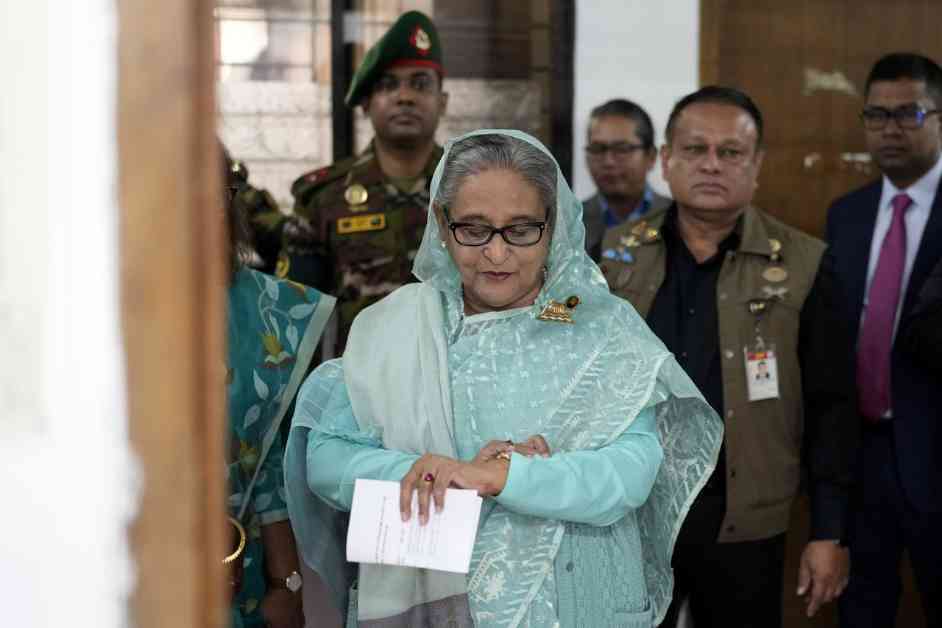Bangladeshi Students Demand Former Prime Minister’s Return for Trial, India Faces Diplomatic Dilemma
Bangladeshi former Prime Minister Sheikh Hasina fled to India four weeks ago amidst escalating student-led protests in Bangladesh. As demands for her return to face trial arise within Bangladesh, analysts point out that her presence in India has become a diplomatic challenge for the Indian government.
The protests in Bangladesh, initiated in July by student groups against the quota system for government jobs, escalated into the most severe unrest during Sheikh Hasina’s 15-year rule. Eventually, on August 5th, she hurriedly stepped down from office and fled the country. The interim government in Bangladesh, established subsequently, revoked her diplomatic passport.
Student groups leading the protests in Bangladesh are now demanding Sheikh Hasina’s return from India for trial, particularly in response to the killings of protesters during the demonstrations. However, the extradition of the 76-year-old Hasina back to Bangladesh could potentially damage India’s standing in the eyes of other South Asian neighbors, especially amidst the intense competition for influence in the region between India and China.
Thomas Kean from the International Crisis Group, a think tank dedicated to conflict resolution, stated, “India is unlikely to want to extradite her back to Bangladesh.” He further added, “This would send a not very positive message to other regional leaders close to New Delhi…that ultimately, India will not protect you.” Those who suffered under Hasina’s rule in Bangladesh now openly resent India for the atrocities committed by her government.
In the chaos following Hasina’s escape, some Indian Hindu believers and temples in Bangladesh became targets of attacks, leading to condemnation from student leaders and the interim government. India and Bangladesh signed a bilateral extradition treaty in 2013, allowing for Hasina to be returned to her country to face criminal trial. However, there is a provision in the treaty stating that extradition requests may be denied if the crimes are deemed to have a “political nature.”
Diplomatic tension between India and Bangladesh is rising as the demand for Sheikh Hasina’s return grows stronger within Bangladesh. The situation poses a significant challenge for India, as the decision regarding Hasina’s extradition could have broader implications for its diplomatic relations in the region.
The diplomatic dilemma faced by India in handling the request for Sheikh Hasina’s return highlights the complexities of navigating political unrest and international relations in the South Asian region. As the situation continues to unfold, both Bangladesh and India are under pressure to address the demands for justice and maintain stability in the region.
Implications for India’s Diplomatic Relations
The demand for Sheikh Hasina’s return to Bangladesh for trial poses a significant challenge for India’s diplomatic relations, especially in the context of its competition with China for influence in the region. The decision regarding Hasina’s extradition will not only impact India’s relationship with Bangladesh but also its standing among other neighboring countries.
Challenges for Bangladesh’s Interim Government
The interim government in Bangladesh faces the difficult task of addressing the demands for justice and stability in the aftermath of Sheikh Hasina’s departure. The government must navigate the complexities of political transition while ensuring accountability for the violence and unrest that occurred during her tenure.
International Response and Human Rights Concerns
The international community is closely monitoring the developments in Bangladesh following Sheikh Hasina’s escape to India. Human rights organizations have raised concerns about the need for accountability for the violence and human rights abuses that took place during her rule. The response from the international community will play a crucial role in shaping the future of Bangladesh’s political landscape.
In conclusion, the demand for Sheikh Hasina’s return to Bangladesh for trial presents a complex diplomatic dilemma for India and underscores the challenges of political transition and accountability in the region. The decision regarding her extradition will have far-reaching implications for both countries and the broader South Asian region. As the situation unfolds, it is essential for all parties involved to prioritize justice, stability, and respect for human rights in addressing the aftermath of Sheikh Hasina’s departure.












